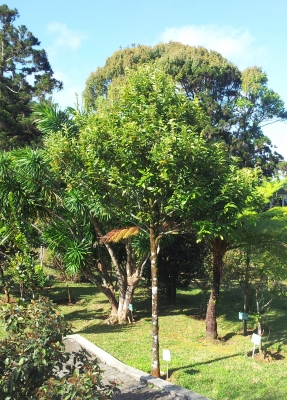Diospyros tessellaria
Poir.
Ebenaceae
Common Name:

Young cultivated tree
Photograph by: S Molteno
Creative Commons Zero, Public Domain Dedication
General Information
Diospyros tessellaria is an evergreen shrub or small tree growing up to 20 metres tall.
A high quality timber, known as 'Mauritius Ebony' is obtained from this tree. It is exported in quantity to other countries.
The habitat is declining and regeneration is poor in areas which are degraded. The tree is classified as 'Vulnerable' in the IUCN Red List of Threatened Species(2010)[
338- Title
- IUCN Red List of Threatened Species
- Publication
-
- Author
-
- Website
- http://www.iucnredlist.org/
- Publisher
-
- Year
- 0
- ISBN
-
- Description
- A list of plants under threat and facing possible extinction, usually with brief details of the threats and information on habitat.
].
Known Hazards
None known
Botanical References
Range
Africa - Mauritius.
Habitat
A dominant component of lowland evergreen forest and upland rainforest in the southwest and eastern mountain ranges[
338- Title
- IUCN Red List of Threatened Species
- Publication
-
- Author
-
- Website
- http://www.iucnredlist.org/
- Publisher
-
- Year
- 0
- ISBN
-
- Description
- A list of plants under threat and facing possible extinction, usually with brief details of the threats and information on habitat.
].
Properties
| Conservation Status | Vulnerable |
| Edibility Rating |      |
| Other Uses Rating |      |
| Habit | Evergreen Tree |
| Height | 15.00 m |
| Cultivation Status | Wild |
Cultivation Details
We have seen no individual confirmation for this species, but in general Diospyros species are dioecious and require both male and female forms to be grown if fruit and seed are required[
899- Title
- Tree Flora of Sabah and Sarawak Vols 1 - 6
- Publication
-
- Author
- Soepadmo E.; Saw L.G.; Chung R.C.K. (Editors)
- Publisher
- Forest Research Institute Malaysia; Kuala Lumpur.
- Year
- 2002
- ISBN
- 983-2181-27-5
- Description
- A flora of the woody plants of Sabah and Sarawak on the island of Borneo, often giving details of plant uses.
].
Edible Uses
Fruit[
511- Title
- Inventory of Seeds and Plants Imported Vol. 23
- Publication
- USDA Bureau of Plant Industry - Bulletin No. 208
- Author
-
- Website
- http://www.biodiversitylibrary.org
- Publisher
- USDA Government Printing Office; Washington DC.
- Year
- 1911
- ISBN
-
- Description
- Details of seeds imported for trials by the United States Department of Agriculture in the second quarter of 1909, often detailing the uses of the plant and various other miscellaneous information. It can be downloaded from the Internet.
].
Medicinal
None known
Other Uses
A high quality timber, known as 'Mauritius Ebony' is obtained from the tree[
46- Title
- Dictionary of Economic Plants.
- Publication
-
- Author
- Uphof. J. C. Th.
- Publisher
- Weinheim
- Year
- 1959
- ISBN
- -
- Description
- An excellent and very comprehensive guide but it only gives very short descriptions of the uses without any details of how to utilize the plants. Not for the casual reader.
]. The bark is black, the sapwood is white and the heartwood black. The wood is used to manufacture keys of musical instruments, small pieces of furniture and in marquetry.
Propagation
Seed - it has a very short viability and so should be sown as soon as possible[
]. The flesh should be removed since this contains germination inhibitors[
]. Sow the seed in a shady position in a nursery seedbed. The sowing media for ebony uses soil and fine sand at the ratio 3:1. The seed is planted horizontally or vertically with
the radicle end down, with a sowing depth of 1 - 1½ times the thickness of seed. Distance between the seeds is 3 - 5cm. Seeds are very sensitive to desiccation during germination and early growth, so must be regularly watered at this time[
]. Normally the seed will germinate after one week. In one trial, fresh seed, sown one day after collection, showed 85% germination rate within 17 - 65 days[
].
As a rule fresh seeds have a high percentage of fertility. The seedlings develop long taproots at an early stage, often before any appreciable elongation of the shoot takes place. The growth of the seedling is decidedly slow [
652- Title
- The Silviculture of Indian Trees
- Publication
-
- Author
- Troup. R.S.
- Website
- http://www.biodiversitylibrary.org
- Publisher
- Oxford, at the Clarendon Press
- Year
- 1921
- ISBN
-
- Description
- An excellent treatment.
].
If you have any useful information about this plant, please leave a comment. Comments have to be approved before they are shown here.
 Useful Tropical Plants Database 2014 by
Ken Fern,
web interface by
Ajna Fern
with help from
Richard Morris.
Useful Tropical Plants Database 2014 by
Ken Fern,
web interface by
Ajna Fern
with help from
Richard Morris.